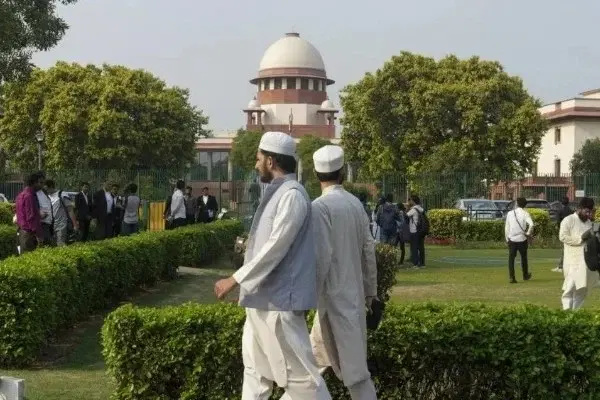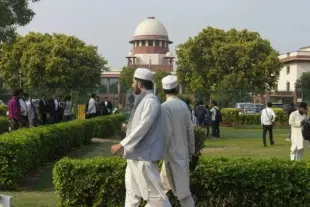Legal
Supreme Court Refuses Blanket Stay: Why Waqf Order Is A Win For Govt
Harsh Anmol
Sep 16, 2025, 03:12 PM | Updated Oct 09, 2025, 09:09 AM IST
Save & read from anywhere!
Bookmark stories for easy access on any device or the Swarajya app.


The Supreme Court on 15th September, 2025 passed an interim order on the Waqf (Amendment) Act, 2025 refusing to grant an overall stay on the amended Act. The Court only stayed certain provisions such as limiting the powers granted to the District Collector in determining the status of a waqf property.
While the Opposition celebrated the stays on such provisions, a deeper examination of the order reveals that the Court’s observations are a judicial affirmation of the Union Government’s legislative intent regarding the reformed governance of waqf properties.
The Road to the Supreme Court
In the last budget session of the Parliament, the Waqf (Amendment) Act was passed after 14 hours of discussion in both the houses. Previously, the Joint Parliamentary Committee led by BJP MP Shri Jagdambika Pal had spent six months over deliberations to refine the law. However, after the Bill received presidential assent, various petitions were filed at the Supreme Court challenging the Act.
On 5th May, former CJI Sanjiv Khanna had deferred hearing in the case to a fresh bench presided over by then CJI-designate B.R. Gavai. CJI Khanna reasoned that, given his upcoming retirement, he would not be able to conclude the case. Following this, the matter was taken up by a bench composed of CJI Gavai and Justice A.G. Masih, which passed the interim order yesterday.
Why Refusing a Blanket Stay Matters
The most significant aspect of the Supreme Court's ruling is what it didn't do- it refused to strike down the Waqf Act entirely. Chief Justice B.R. Gavai observed that "the presumption is always in favour of the constitutionality of the statute" as the bench ruled that a full stay of the Act was not justified because “a case was not made out to stay the entire statute.”
This presumption shifts the burden onto the petitioners to prove the challenged provisions as unconstitutional. The Union Government, by contrast, can continue implementing almost all parts of the Act while defending the few stays. It is crucial to highlight that the partial relief granted to the petitioners doesn’t force the Government to withdraw the challenged provisions, but only pauses them in limited respects.
Tackling Misuse By End of 'Waqf by User'
The abolition of "waqf by user" which allowed properties to acquire waqf status through continuous religious use remains intact. The Court referred to instances of encroachment of Government lands, particularly in Andhra Pradesh wherein the State Waqf Board had notified thousands of acres of land belonging to the Government as waqf property.
The petitioners opposing the amendment argued that removing this provision would adversely impact numerous long-standing Waqf properties that lack formal registration documents. However, the Supreme Court observed that the requirement for Waqf registration has existed since the Waqf Act of 1923. Therefore, Waqfs that have remained unregistered for over a century cannot now claim to be aggrieved.
For years, the ruling BJP has argued that the “waqf by user” provision has been misused to encroach upon vast swathes of public and private land, with properties being claimed as Waqf based on long-term usage for religious purposes without formal dedication. By allowing the deletion of this provision, the Supreme Court has effectively upheld the Government’s claim of rampant misuse of waqf properties and the need for stricter regulation.
Procedural Pauses, Not Substantive Roadblocks
The Court has held that the provision requiring a person to have practiced Islam for at least five years to create a waqf is not arbitrary. Therefore, such provision has been stayed by the Court with the condition that the stay will remain in effect only until the Government frames rules in this regard..
Additionally, the Court’s numerical limitations on the presence of non-muslim members in the Waqf Council and State Waqf Boards actually validates the principle of inclusive governance while ensuring majority Muslim control. It represents a balanced approach of the Court that addresses concerns of the minority while maintaining the Government's core objective of bringing diverse perspectives to Waqf governance.
Implications for Governance and Future Reforms
In providing a firm legal foundation for the Government's reform agenda while fine-tuning the implementation of the Act, the Court has provided exactly the kind of balanced judicial oversight that strengthens democratic institutions while enabling necessary reform. What remains in force are many key measures of the amended Act that enable better regulation of waqf properties, greater accountability, and clarity in governance.
The order targets long-standing issues of mismanagement and a lack of transparency, upholding the 21st century governance that serves actual beneficiaries rather than entrenched interests. These are exactly the kinds of reforms the Government has promised: to modernize administration, protect legitimate waqf property, and to close gaps in misuse or misclassification. By allowing such reforms to proceed, the Court has entrusted the Government to implement its mandate of responsible governance of waqf properties.
Harsh Anmol is a lawyer and public policy consultant at NFPRC.





